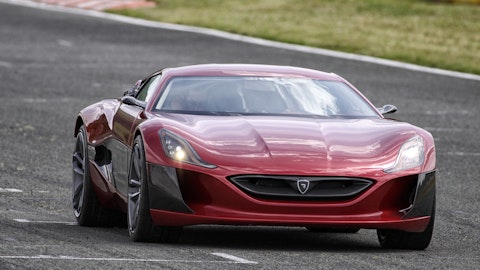Pokemon Go has been nothing short of a revelation since debuting on mobile devices in early July. The Niantic-developed, The Pokemon Company-published game has in three short weeks become the most popular mobile game ever in the U.S., with peak active daily users already reaching 23 million, topping previous record-holder Candy Crush Saga, which peaked at 22 million in 2013. The augmented reality game has also leapfrogged every other app in daily usage time on iOS devices, with users spending an average of 33:15 playing the game, while Facebook Inc (NASDAQ:FB) ranks a distant second at 22:48.
While the game is free to download and play, players can purchase PokeCoins through in-app purchases, which allow the user to buy items that can help them lure monsters and train the ones they’ve captured. The game’s massive popularity is such that its paying player base quickly eclipsed that of every other mobile game combined, according to data compiled by Slice Intelligence, though the paying user base has already shrunk by about 32% from its peak in mid-July.
Naturally, the success of the game has done wonders for several companies’ stocks over the past three weeks, as you can see in the table below. We’ll take a closer look at the performance of each company and their relationship to Pokemon Go in this article. We’ll also use hedge fund data to see how those stocks have been traded by top investors of late.
Through extensive research that covered the portfolios of several hundred large investors between 1999 and 2012, we determined that following the small-cap stocks that large money managers are collectively bullish on, can generate monthly returns nearly 1.0 percentage points above the market (see the details here).
Post-Pokemon Go Stock Performance
| Company/Ticker | Stock Performance (July 6 – July 29, 2016) |
|---|---|
| Nintendo Co., Ltd (ADR) (OTCMKTS:NTDOY) | +46.23% |
| Apple Inc. (NASDAQ:AAPL) | +9.71% |
| Alphabet Inc (NASDAQ:GOOGL) | +12.26% |
| T MOBILE US INC (NYSE:TMUS) | +7.24% |
| GameStop Corp. (NYSE:GME) | +17.68% |
Nintendo Co., Ltd (ADR) (OTCMKTS:NTDOY)
– Hedge Funds with Long Positions (as of March 31): N/A
– Aggregate Value of Hedge Funds’ Holdings (as of March 31): N/A
– Percentage of Shares Owned by Hedge Funds (as of March 31): N/A
Naturally, Nintendo has benefited the most from the success of Pokemon’s debut on mobile devices (which Nintendo resisted publishing games on for years, as mobile devices compete with its own handheld systems). Nintendo shares more than doubled at one point to $37.37, pushing the game maker’s market value past rival Sony Corp (ADR) (NYSE:SNE)’s briefly. However, shares have fallen by about 30% from their peak after Nintendo revealed that its economic interest in the game was just 13%, as it owns just a 33% stake in the game’s publisher The Pokemon Company, and a lot of other parties get cuts of the game’s revenue (namely Apple and Google, more on them later).
Nonetheless, it’s a huge hit and cash cow for Nintendo, which is planning to release several other mobile games this year. The Japanese company is also planning to self-publish Pokemon Go Plus, a wearable device that will let players play the game without needing to have their phones in their hands (though their phones will have to be close by, as it communicates with the app using Bluetooth.
Given that its ADR’s are traded over-the-counter in the U.S., as opposed to being listing on a major exchange, Nintendo Co., Ltd (ADR) (OTCMKTS:NTDOY) shares were not held by any of the hedge funds in our database on March 31, and by just ten 13F-filing institutional investors overall.
Follow Nintendo (OTC:NTDOY)
Follow Nintendo (OTC:NTDOY)
Receive real-time insider trading and news alerts
GameStop Corp. (NYSE:GME)
– Hedge Funds with Long Positions (as of March 31): 32
– Aggregate Value of Hedge Funds’ Holdings (as of March 31): $390.60 million
– Percentage of Shares Owned by Hedge Funds (as of March 31): 11.90%
Despite Pokemon Go not having any sort of retail edition that GameStop Corp. (NYSE:GME) can sell, the gaming retailer’s shares have gained nearly 18% since the game’s release, as it’s branded itself as a welcoming hub for players of the game to congregate. GameStop CEO J. Paul Raines told CNBC earlier this month that locations which had held Pokemon events saw foot traffic and sales spike, with sales jumping by as much as 100% at those locations. In addition to games, GameStop sells a wide range of gaming merchandise, the latter of which has helped counter declining physical game sales. In addition to the augmented reality boom that Pokemon Go is sure to spawn, GameStop is also heavily counting on virtual reality headsets being the next big thing in gaming, and sales of anything related to VR gaming have been strong ahead of the release of several major VR headsets over the next year or so.
LMR Partners, managed by Ben Levine, Andrew Manuel, and Stefan Renold, added a 64,487-share position in GameStop Corp. (NYSE:GME) to its portfolio during the second quarter.
Follow Gamestop Corp. (NYSE:GME)
Follow Gamestop Corp. (NYSE:GME)
Receive real-time insider trading and news alerts
We’ll run through three other stocks that are soaring since Pokemon Go’s release on the next page.
Apple Inc. (NASDAQ:AAPL)
– Hedge Funds with Long Positions (as of March 31): 152
– Aggregate Value of Hedge Funds’ Holdings (as of March 31): $14.82 billion
– Percentage of Shares Owned by Hedge Funds (as of March 31): 2.50%
Follow Apple Inc. (NASDAQ:AAPL)
Follow Apple Inc. (NASDAQ:AAPL)
Receive real-time insider trading and news alerts
Alphabet Inc (NASDAQ:GOOGL)
– Hedge Funds with Long Positions (as of March 31): 215
– Aggregate Value of Hedge Funds’ Holdings (as of March 31): $29.88 billion
– Percentage of Shares Owned by Hedge Funds (as of March 31): 2.90%
Follow Alphabet Inc. (NASDAQ:GOOG)
Follow Alphabet Inc. (NASDAQ:GOOG)
Receive real-time insider trading and news alerts
Alphabet Inc (NASDAQ:GOOGL) and Apple Inc. (NASDAQ:AAPL) make the list for the same reason, as they each enjoy a healthy cut of the game’s revenue, with minimal expense of their own. Each company collects about 30% of the game’s in-app purchases made through their app stores, which will add millions to their bottom-lines, with Pokemon Go reportedly pulling in over $10 million in app sales daily according to App Annie. Pokemon Go has soared past 50 million downloads through the Google Play Store, while topping 25 million on iOS devices.
Given that Apple and Google are $500+ billion companies, the fact that they’re actually raking in more Pokemon Go dough than Nintendo right now is still having a smaller effect on their stocks. Google is up by 12% since the game’s release, while Apple is up by nearly 10%. However both companies have also released positive earnings reports during that time, which contributed to some of those gains (almost all of them in Apple’s case). Still, Pokemon Go and the potential for future hit Nintendo or augmented reality games on their app stores is icing on the cake for the two tech behemoths.
As an interesting aside, Pokemon Go developer Niantic was formerly a part of Google before that company’s re-organization into Alphabet last year, at which point Niantic was spun off into an independent company. It later inked a $30 million pact with Nintendo and The Pokemon Company and the rest is history.
A combined 215 hedge funds in our database owned either the Class A (GOOG) or Class C (GOOGL) shares of Alphabet Inc (NASDAQ:GOOGL) on March 31, while 152 hedge funds were shareholders of Apple Inc. (NASDAQ:AAPL). Those investors had nearly $45 billion invested in the two companies. Billionaire Ken Fisher‘s Fisher Asset Management owns large positions in both stocks as of the end of June.
T MOBILE US INC (NYSE:TMUS)
– Hedge Funds with Long Positions (as of March 31): 52
– Aggregate Value of Hedge Funds’ Holdings (as of March 31): $2.32 billion
– Percentage of Shares Owned by Hedge Funds (as of March 31): 7.40%
Lastly is T MOBILE US INC (NYSE:TMUS), shares of which have gained over 7% since Pokemon Go’s release. The carrier is offering free Pokemon Go data coverage to customers for a year to try and sway some of the game’s massive player base into switching carriers, though the game’s data usage is not particularly high. Known as “zero-rating”, the practice of exempting certain services from data charges is a controversial one in terms of net neutrality, as it encourages users to prioritize the use of one app or game over another. While T-Mobile has also benefited from a strong earnings report this month that showed robust subscriber growth (before Pokemon Go was released), investors are also looking at the game to drive further subs growth in the coming quarters.
T MOBILE US INC (NYSE:TMUS) was held by 52 hedge funds that we track as of March 31, up from 50 at the end of 2015. Billionaire John Paulson‘s Paulson & Co owned 14.62 million shares of the company at the end of March.
Follow T-Mobile Us Inc. (NASDAQ:TMUS)
Follow T-Mobile Us Inc. (NASDAQ:TMUS)
Receive real-time insider trading and news alerts
Disclosure: None





